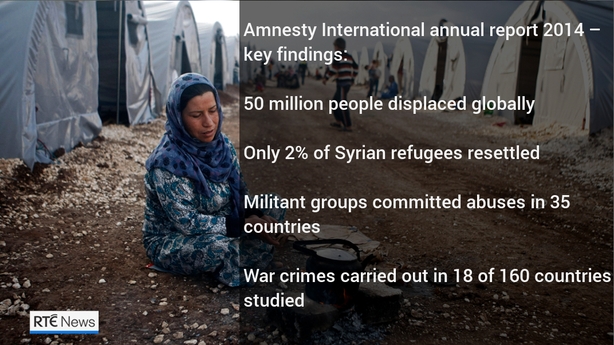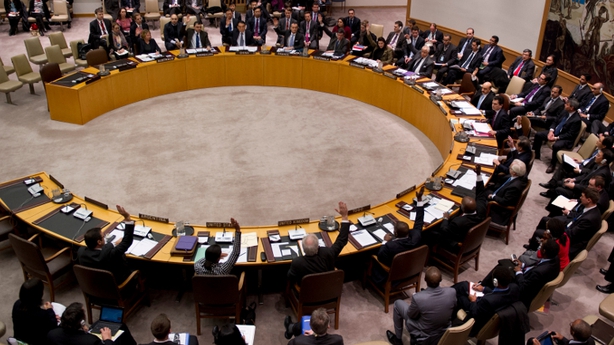Amnesty International has condemned world leaders for what it termed their "shameful and ineffective" failure to protect civilians from groups like Islamic State, calling 2014 a "catastrophic" year.
In its 415-page annual report detailing abuses in 160 countries, the group accused governments of "pretending the protection of civilians is beyond their power."
It said millions of civilians had been killed from Syria to Ukraine, while the number of displaced people around the world exceeded 50 million last year for the first time since the end of World War II.

"2014 was a catastrophic year for millions caught up in violence," Amnesty's Secretary General Salil Shetty said.
"The global response to conflict and abuses by states and armed groups has been shameful and ineffective.
"As people suffered an escalation in barbarous attacks and repression, the international community has been found wanting."
Amnesty warned that the situation would get worse this year unless leaders took immediate action.

It singled out the United Nations Security Council for criticism, with Mr Shetty saying it had "miserably failed" to protect civilians.
The five permanent UNSC members - Britain, China, France, Russia and the US - "consistently abused" their veto right to "promote their political self-interest or geopolitical interest above the interest of protecting civilians," he added.
Amnesty is now urging the five states to give up their right to veto action in cases where genocide and other mass killings are being committed.
This proposal is similar to a push being led by France with the backing of 70 countries, but Amnesty hopes its support will give the idea fresh impetus.
It believes the move would give the UN a better chance to save civilian lives in conflict zones.
Amnesty also urged all states to abide by a treaty regulating the international arms trade which came into force last year, saying this could help stop huge shipments of weapons to countries like Syria and Iraq.
In addition, it called for new restrictions on the use of explosive weapons like mortars and rockets in populated areas.
Amnesty welcomes Irish reforms
On Ireland, Amnesty International welcomed the recommendations of the Constitutional Convention on civil marriage for same-sex couples, removing the offence of blasphemy, and the incorporation of economic, social and cultural rights into the constitution.
According to the agency, the decision by the Government that the European Court of Human Rights review its 1978 judgement in Ireland vs United Kingdom regarding torture in the ‘Hooded Men’ case was a positive move towards redressing impunity.
In addition, Ireland’s ratification of the 3rd Optional Protocol on the UN’s Convention on the Rights of the Child was welcomed.
However, Amnesty said abortion legislation continues to fail to comply with Ireland’s human rights obligations as the guidance related to the Protection of Life in Pregnancy Act in 2014 provided insufficient guidance to medical professionals in assessing when a pregnancy posed a risk to life.
Syrian refugees failed by EU
The human rights group, which says it has seven million campaigners worldwide, sharply criticised the European Union's response to the four million Syrian refugees displaced by conflict in the world's worst refugee crisis.
By the end of 2014, only 150,000 Syrian refugees were living in EU states, it said, while 3,400 refugees and migrants had died in the Mediterranean Sea trying to make their way to Europe.
"The response of the EU and its member states was, with few exceptions, driven above all by the desire to keep them out," the report said.
Mr Shetty added that the European response to the problem was "actually pushing people into the water of the Mediterranean."
The report said only 2% of refugees from Syria had been resettled by the end of last year, and called for this figure to at least triple this year.
Overall, armed groups like IS, Boko Haram and Shebab were found to have committed abuses in 35 countries last year, Amnesty said - over one in five of those investigated for the report.
Across the border from Syria in Iraq, Amnesty said there was a "marked deterioration in human rights" across the board, as fighting against the IS group intensified.
"IS fighters committed widespread war crimes, including ethnic cleansing of religious and ethnic minorities through a campaign of mass killings of men and abduction and sexual and other abuse of women and girls," the report said.
"Government forces carried out indiscriminate bombing and shelling in IS-controlled areas, and government-backed Shi'a (Shiite) militias abducted and executed scores of Sunni men in areas under government control."

